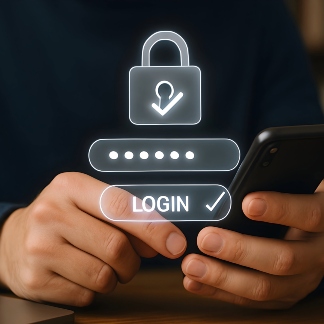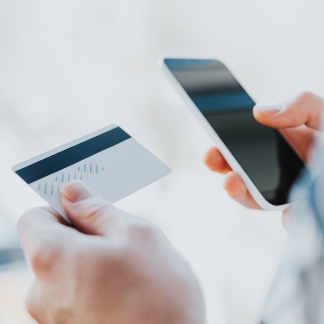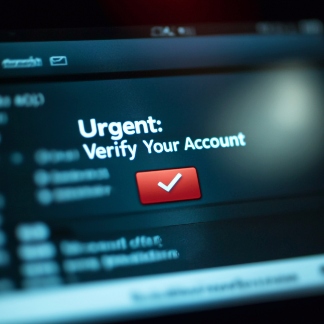
You better watch out: Outsmart holiday scams before they can rob you of your holiday spirit.
The holiday season is a time for joy, celebration and, unfortunately, an uptick in scams. At Capital City Bank, we believe that staying safe during this festive time doesn’t have to be a drag. Here’s your guide to spotting scams while keeping the holiday spirit alive.

How it can happen:
You've been searching for a last-minute gift, and an ad pops up on your social media feed promoting the exact brand-name headphones you've been hunting for at half the price of every other retailer you've seen. You can't believe the deal you've found and excitedly complete the purchase with your card.
Not only do the headphones never arrive, you begin seeing unfamiliar charges. Turns out, it was a scammer offering that "great deal" on a faked website, and they stole your card information via their bogus "checkout" page.
|
How to play it safe: If a deal looks too good to be true - it probably is. Always verify URLs, first that you're on a brand's official website, then look for the “https” at checkout. Even with verified purchases, opt for a digital wallet like Apple Pay or Google Pay to avoid exposing card information. |
 How it can happen:
How it can happen:
You're out of town visiting family for the holidays and try to use your debit card to finish up the last of your holiday shopping. You swipe your card at checkout, and it declines.
| How to play it safe: Let your financial institution know when you're traveling - don’t get caught on the wrong side of security processes designed to protect you. |
 How it can happen:
How it can happen:
You notice an unfamiliar charge. It's only a few dollars, so you're not overly concerned. You make a note to call the bank later and get it resolved. Two weeks later, several hundred dollars is missing from your account.
Sometimes scammers test the waters by trying a small purchase before moving on to larger ones. Checking your account regularly and taking swift action when you see activity you don't recognize can prevent larger losses.
| How to play it safe: With online and mobile banking, you can react more quickly to transactions you don't recognize. |
 How it can happen:
How it can happen:
You get a call from someone claiming to be your utility company - your bill is overdue! They're threatening to shut off your service unless you pay immediately. But rather than asking for credit card or banking information, they direct you to buy gift cards in the amount you owe and read the numbers to them over the phone.
Once you give them the gift card information, they vanish - and so does your money.
|
How to play it safe: Know that anyone asking you to purchase gift cards as payment or for an emergency is trying to scam you. Gift cards are for gifts. No legitimate business or agency will ask you to pay with a gift card. Scammers use impersonation tricks, so if the request appears to come from a friend or family member, verify first by contacting them at a known number. |
 How it can happen:
How it can happen:
You receive a text that appears to be from your bank claiming your online banking account will be locked unless you sign in right away. There's a link in the text that takes you to a login page.
You take a second to notice your bank's logo is present, so you proceed with entering your credentials and click "Login."
As soon as you do, it hits you: You are on a spoofed page designed to look like your legitimate online banking login page. Now the scammer has your credentials and is using them to log into your account and move money out.
| How to play it safe: If you've received a text with a link or someone is asking you to provide financial or personal information, stop. It's fraud. |
 How it can happen:
How it can happen:
You always mail checks to the grand kids so they can buy themselves something they really want. You stuff checks into cheerful holiday greeting cards along with your love and best wishes, and drop them in the mailbox to be picked up. Two weeks later, when you call eager to find out what treasures they acquired with their gift money, you find out they never arrived.
You learn that your neighborhood was hit by a criminal who rummaged through your and your neighbor's mailboxes, stealing cards and envelopes containing checks and payment information. They "washed" the ink and rewrote the checks to themselves, changing the payment amounts too, and made off with the money you had earmarked for the grand kids - and then some.
| How to play it safe: When paying bills or giving gifts, opt for secure electronic payments or your Zelle® service to avoid mail theft troubles. |
 How it can happen:
How it can happen:
You receive a text or e-mail stating your holiday package requires additional postage before delivery. It includes a link to resolve the balance.
The link leads to a fake payment page that captures your credit card information, which a scammer quickly uses to rack up hundreds of dollars in unauthorized purchases.
| How to play it safe: Be wary of texts or e-mails stating there was a problem with delivery or more postage is due. Contact the delivery service directly using verified contact information, not a phone number or link provided in the notice. |
 How it can happen:
How it can happen:
You receive a disturbing call - the voice on the other line identifies themself as law enforcement and claims there's an outstanding warrant for your arrest! They instruct you to deposit cash into a Bitcoin ATM to settle the matter, and you must do it right away to avoid being arrested.
You glance quickly at the caller ID - it matches the caller's claim, so it must be true. You lose no time following their instructions because they're adamant - it has to be now or you'll have to sort it out from behind bars.
| How to play it safe: If anyone directs you to pay with cryptocurrency or deposit money in a Bitcoin ATM, it is fraud. Hang up and call the agency directly to verify the claim using a verified number, not one the caller provides. |
Received an unexpected call from someone claiming to be your bank?
Be alert to the latest transaction verification scams.
How it might happen:
A scammer calls from a number that appears to be Capital City Bank or another trusted financial institution. They claim they need to verify a transaction, and now they are sending a text message containing a link they want you to click to confirm it. Stop. It's a scam.
Why you should be suspicious:
- Unexpected contact: Any unexpected call, text or e-mail about a transaction or your account is a red flag.
- Spoofed caller ID: Scammers have technology that allows them to appear to be calling from numbers you trust, so be cautious even if you recognize what is showing on the caller ID.
- Texts with links: We will never send text messages with a link to log in for any reason.
What to do:
Hang up. Don't click.
If anything feels off about a call, text or e-mail you have received, even if the caller ID is familiar, the best response is no response. Hang up, ignore the text or e-mail, and call us at a number you know.
If in doubt, use verified contact numbers on our website or the back of your debit card.
Your security is our priority.
At Capital City Bank, we are committed to helping you protect what matters most. As fraud tactics continue to evolve, staying informed is your best defense. Here you will find tools, tips and resources to help you recognize common scams, safeguard your accounts and take quick action if something does not seem right. We are here to help you bank confidently.
NEVER SHARE: Be confident that we will NEVER contact you and ask you to:
- Confirm any part of your debit card number, PIN or CVV
- Verify your online banking username or password
- Share a Secure Access Code (the six-digit code you receive when logging into online banking)
- Allow access to your device to fix a problem in your account
- Log into online or mobile banking via a link in a text or e-mail
HANG UP, DON'T CLICK AND VERIFY: If you receive a suspicious communication, the safest response is to hang up immediately or ignore the text or e-mail, and call us directly at a verified number on our website or the back of your debit card.Your safety and security are our top priority. Stay vigilant and protect your personal information.
Don't fall for money scams. Know what to look for.
No legitimate company, government agency or financial institution will ever ask you to lie to your banker, pay with gift cards or send money via crypto.
If someone is demanding payment or requesting money, ask yourself:
-
Did I get a text or e-mail with a link or receive a call immediately after replying to a text?
-
Is someone I don’t know or haven’t met asking me to deposit money into a Bitcoin/Crypto ATM, wire money or purchase gift cards?
-
Has someone told me to give false information to my banker about a withdrawal or wire transfer?
-
Is a government agency or law enforcement demanding urgent payment to avoid arrest or other consequences?
-
Am I sending money to someone I’ve never met in person - possibly from an online relationship?
-
Am I being asked to return funds received as an overpayment or refund?
-
Am I being promised an investment or prize that seems too good to be true?
-
Was I told to withdraw money to “protect” it from fraud?
-
Is someone claiming to be a relative who urgently needs money due to some type of emergency?
-
Am I planning to meet a stranger to hand over cash?
-
Am I being instructed not to tell anyone about why the money is needed?
- What to do if you suspect fraud on our account or debit card
- My account or debit card has been compromised. Now what?
- How we protect you from fraud
- What to do if you are a victim of Identity Theft
Read more about other common scams.

Spot it:
These scams work because, not only do they use advanced spoofing capabilities to give the appearance of trustworthiness by imitating familiar phone numbers and e-mail messaging. They also prey on consequences we all fear, such as having our hard-earned money stolen or debit cards shut off.
Your Capital City Bankers want to help ensure you know how to tell the difference if one day you pick up the phone and hear, “This is Capital City Bank calling.”
Are they:
- Asking for information only you should have? Neither Capital City Bank, nor any financial institution, needs you to share your debit card number, debit card PIN, debit card CVV, online banking username or password — not to authenticate you and not to assist with servicing your account or debit card. We won't ask. Not ever.
- Pressuring you? Fraudsters threaten; your bankers reassure. Scammers create urgency and exploit fear, trust or an emotional need to help someone by claiming immediate action is necessary to avoid consequences. Your banker will never pressure you into a financial decision. Fraudsters, on the other hand, don’t want to give you time to think it through.
- Stalling or drawing out the call? Fraudsters have to overcome a number of security protocols intended to protect your account against unauthorized access, so they want to keep you on the phone providing information. As your bankers, we know you’ve got life to get back to, so our goal is not to take any more of your time than necessary.
- Giving unusual instructions like download an app, share Secure Access Codes that are always meant only for you, or participate in a screen share so they can show you activity in your account?
- Directing you to wire funds, purchase gift cards, mail cash, or scan a QR code to deposit cash into a Bitcoin ATM to rectify an error on your account, pay a fine or avoid serious consequences?
Avoid it:
If receiving a request like this, the safest response is no response. Tell the fraudsters you’re wise to their game by giving them the dial tone. Hang up and call us right away at the number on the back of your debit card.
A caution about links and unverified contact information:
Remember scammers use links in e-mails and text messages to misdirect you to fraudulent sites where they can steal financial information and account credentials. Do not click links appearing e-mail or text messages, or call phone numbers provided in unexpected calls, texts or e-mails. Always go to a company’s website directly when looking for contact information, and do not trust contact information you find in web search results.
Learn more about steps you can take, including temporarily freezing your card online, on our website at ccbg.com/topics/fraud-and-security.
Explore the key components of the business impersonation scam below.
- The most commonly impersonated businesses are Amazon followed by Apple, according to the Federal Trade Commission, but the caller could be using the name of any familiar business – even a government agency.
- Contact can be attempted via phone, text or e-mail.
- Contact is usually not initiated by you.
- The name or number on your caller ID might look legitimate because advanced spoofing capability now used widely by scammers allows them to disguise actual caller information.
Scam-Savvy Tips:
- Legitimate organizations won’t call, text or e-mail to ask for your personal information, including Social Security numbers and bank account details.
- Stop unwanted calls and texts from reaching you by blocking them on your phone.
- If you have reason to believe an e-mail or text from a company you do business with is real, it’s always best to verify the sender before clicking any links. But look up their contact information on their website and do not trust phone numbers provided in the message or on your caller ID. Today, these are easily spoofed by scam
- We owe you a refund.
- You owe.
- You’ve won and we need to get you your prize.
Links to “claim a free prize” commonly lead to a page where you’re asked to provide payment information to cover shipping costs. The only “prize” you’ll receive is unauthorized activity on your card or account. - There’s a problem, e.g. an error on your account, a virus on your computer, you are in trouble with the government, there’s been an emergency.
You can easily confirm suspicions by contacting the company or agency directly instead of following the instructions given on the call or e-mail. Remember to obtain contact information from a verified source, e.g. the company's website or the back of your debit or credit card. Do not trust contact information left in e-mails, voicemails or text messages.
Spot it:
Scammers will claim a variety of identities to gain your trust - pretending to be from a government agency and even impersonating a loved one's voice - and may give convincing reasons they need payment via gift cards, but any story that ends with you needing to purchase gift cards to settle a debt or resolve an issue is always a scam.
After you have purchased the gift cards, they will ask you for the card numbers and PIN. The moment you've shared them, your money is gone.
Avoid it:
Is someone:
- Asking you to buy gift cards for any reason?
- Claiming it's confidential or otherwise urging you to stay quiet?
- Pressuring you to act immediately to avoid imminent consequences or losing the opportunity?
- Requiring you to either mail gift cards, text pictures of the numbers and codes or read them over the phone?
Stop immediately and hang up or ignore the message. You can know for certain it's a scam if anyone - regardless of the reason or who they have led you to believe they are - asks you to buy gift cards to pay a bill, fix a problem, claim a prize or help a loved one.
No legitimate business or government agency will ever require payment by gift card.
- The most commonly impersonated businesses are Amazon followed by Apple, according to the Federal Trade Commission, but the caller could be using the name of any familiar business – even a government agency.
- Contact can be attempted via phone, text or e-mail.
- Contact is usually not initiated by you.
- The name or number on your caller ID might look legitimate because advanced spoofing capability now used widely by scammers allows them to disguise actual caller information.
Scam-Savvy Tips:
- Legitimate organizations won’t call, text or e-mail to ask for your personal information, including Social Security numbers and bank account details.
- Stop unwanted calls and texts from reaching you by blocking them on your phone.
- If you have reason to believe an e-mail or text from a company you do business with is real, it’s always best to verify the sender before clicking any links. But look up their contact information on their website and do not trust phone numbers provided in the message or on your caller ID. Today, these are easily spoofed by scammers.
- We owe you a refund.
- You owe.
- You’ve won and we need to get you your prize.
Links to “claim a free prize” commonly lead to a page where you’re asked to provide payment information to cover shipping costs. The only “prize” you’ll receive is unauthorized activity on your card or account. - There’s a problem, e.g. an error on your account, a virus on your computer, you are in trouble with the government, there’s been an emergency.
You can easily confirm suspicions by contacting the company or agency directly instead of following the instructions given on the call or e-mail. Remember to obtain contact information from a verified source, e.g. the company's website or the back of your debit or credit card. Do not trust contact information left in e-mails, voicemails or text messages.
Scammers try to convince you your account has been compromised and you must send money using a bitcoin ATM.
Spot it:
No bank, financial institution or legitimate organization will ask you to send money using a Bitcoin ATM.
Avoid it:
Remember not to trust website links provided in e-mails or texts. They could be taking you to a spoofed website.
Crooks intercept everyday bill remittances at the mailbox to use envelope contents and information to commit check fraud and identity theft.
Any check sent in the mail is at risk as the number of incidents reported and associated fraud losses continue to climb in all parts of the country. And the risk to the individual exceeds the obvious loss of funds. Since many bill payments are often accompanied by remittance slips containing other private personal and financial information such as account numbers and Social Security numbers, a single envelope could supply a criminal with all they need to commit identity theft as well.
Spot it:
There may be no way of spotting this type of fraud until it's too late since thieves are simply intercepting and redirecting the funds. From the account holder's perspective, payments post to their accounts as expected, so often, the first indication something went wrong is when they receive word from the biller that the payment was never received. Otherwise, when the intended recipient does not expect the delivery - as with checks or gift cards mailed in birthday or holiday cards - there may never be any indication.
Avoid it:
The only sure-fire way to eliminate your risk is to avoid mailing checks altogether and adopt a few mail-theft-resistant habits:
- Enroll in electronic statements. Opting for paperless billing and statements reduces the amount of sensitive financial information that sits unsecured in your mailbox.
- Make electronic payments at the biller’s website or use the Bill Pay feature of your online banking service. Most bill payments are sent electronically. In cases when mailing a check is necessary – the payee is not able to accept electronic payments, for example – Bill Pay is still a more secure option because, unlike the checks in your checkbook, bank-issued checks do not include your signature. Fraudsters look for checks with signatures because they can be copied or forged.
- Send holiday cheer using Zelle® (personal accounts only) instead of mailing checks, cash or gift cards. Use the Notes section to add personalized holiday greetings. Remember, you should always know the person to whom you are sending money, no matter the method.
- Business owners, ask us about ACH Origination for business deposits and payments via electronic transfer. Contact us at 888.671.0400 for more information.
Scams involving technical support are on the rise.
Even if a caller claims to be from a business you know, be suspicious and contact your banker immediately if they are asking you to give them remote access to your computer to fix an error or review recent account activity.
Spot it:
This type of scam often claims you have received too large a refund and must return the overpaid amount or you must pay a fee immediately to avoid serious consequences. The goal is to trick you into sending money - most often by purchasing gift cards or depositing cash into a Bitcoin ATM - or giving them access to your bank accounts - either by revealing your login information .
Scammers are well scripted, organized and convincing, but even the most sophisticated schemes give themselves away if you know what to look for.
No matter the circumstances, do not trust anyone who is:
- Asking for information only you should have. Neither Capital City Bank, nor any financial institution, needs you to share your debit card number, debit card PIN, debit card CVV, online banking user name or password — not to authenticate you and not to assist with servicing your account or debit card. We won't ask. Not ever.
- Pressuring you. Fraudsters threaten; your bankers reassure. Scammers create urgency and exploit fear, trust or an emotional need to help someone by claiming immediate action is necessary to avoid consequences. Your banker will never pressure you into a financial decision. Fraudsters, on the other hand, don’t want to give you time to think it through.
- Stalling or drawing out the call. Fraudsters have to overcome a number of security protocols intended to protect your account against unauthorized access, so they want to keep you on the phone providing information. As your bankers, we know you’ve got life to get back to, so our goal is not to take any more of your time than necessary.
- Giving unusual instructions like download an app, share Secure Access Codes that are always meant only for you, or participate in a screen share so they can show you activity in your account.
- Directing you to wire funds, purchase gift cards, mail cash, or scan a QR code to deposit cash into a Bitcoin ATM to rectify an error on your account, pay a fine or avoid serious consequences.
A caution about links and unverified contact information:
Remember scammers use links in e-mails and text messages to misdirect you to fraudulent sites where they can steal financial information and account credentials. Do not click links appearing e-mail or text messages, or call phone numbers provided in unexpected calls, texts or e-mails. Always go to a company’s website directly when looking for contact information, and do not trust contact information you find in web search results.
Explore the key components of the business impersonation scam below.
- The most commonly impersonated businesses are Amazon followed by Apple, according to the Federal Trade Commission, but the caller could be using the name of any familiar business – even a government agency.
- Contact can be attempted via phone, text or e-mail.
- Contact is usually not initiated by you.
- The name or number on your caller ID might look legitimate because advanced spoofing capability now used widely by scammers allows them to disguise actual caller information.
Scam-Savvy Tips:
- Legitimate organizations won’t call, text or e-mail to ask for your personal information, including Social Security numbers and bank account details.
- Stop unwanted calls and texts from reaching you by blocking them on your phone.
- If you have reason to believe an e-mail or text from a company you do business with is real, it’s always best to verify the sender before clicking any links. But look up their contact information on their website and do not trust phone numbers provided in the message or on your caller ID. Today, these are easily spoofed by scammers.
- We owe you a refund.
- You owe.
- You’ve won and we need to get you your prize.
Links to “claim a free prize” commonly lead to a page where you’re asked to provide payment information to cover shipping costs. The only “prize” you’ll receive is unauthorized activity on your card or account. - There’s a problem, e.g. an error on your account, a virus on your computer, you are in trouble with the government, there’s been an emergency.
You can easily confirm suspicions by contacting the company or agency directly instead of following the instructions given on the call or e-mail. Remember to obtain contact information from a verified source, e.g. the company's website or the back of your debit or credit card. Do not trust contact information left in e-mails, voicemails or text messages.
What you should know: Urgency is a ploy used by scammers because they want you to act before you have time to think about whether their requests make sense.
Scam-Savvy Tip: Where a legitimate business will allow you time to make a decision, a scammer succeeds by using fear or threats to induce you to act immediately.
What you should know: These scams usually begin with a call, text or e-mail claiming a problem with your account or debit card to get your attention. They either provide a phone number to call or ask you for a response that will trigger someone to call you (e.g. a text message asking you to confirm a recent purchase. When you reply that you did not make the purchase, they call.) At some point during the call, they say they need access to your device to resolve the issue, and they send a link to click to allow them in. The link may appear to launch some action on your device but this is all part of the deception. Their goal is obtaining your online banking credentials so they can access to your account and steal funds.
Scam-savvy Tip: Even if a caller claims to be from a business you know, be suspicious and contact your banker immediately if they are requesting access to your device for technical assistance.


